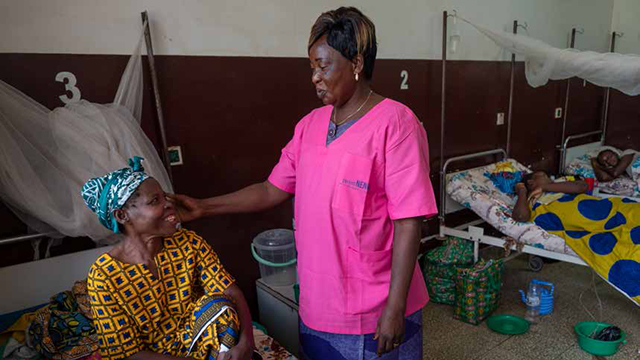Support for creation and development of a bush hospital
— Senegal —

BACKGROUND
Senegal, having a National Health Development Plan (PNDS) in place since 1998, had an infant mortality rate of nearly 77‰ in the early 2000s, much lower than that of sub-Saharan Africa (92‰). Its rural areas, however, are less protected, especially those of Kolda and Tambacounda (100‰), according to the USAID report of September 2009. Among the leading causes of death: respiratory infections, malaria, perinatal conditions and tuberculosis. In 2003, to improve access to healthcare for isolated populations, Fondation Pierre Fabre decided to support the work of the Kinkeliba association, and more specifically the creation of a medical facility located in the bush, at Wassadou (Tambacounda region).
The ground-breaking took place at the end of that year and the facility was official opened in 2005. Built on three hectares, with a medical ward, maternity ward and specialties ward, as well inpatient hospitalisation facilities with 14 beds, the medical centre has a dozen of young and motivated employees that see patients by appointment from Monday to Friday and ensure non-stop, 24/7 emergency care. Field trips are also made into the bush to treat people unable to travel to the facilities and provide them with prevention guidance. In all, a population of more than 22,000 people is covered by this centre.
Two years after it opened, the Wassadou healthcare facility is always full, and Fondation Pierre Fabre has consistently renewed its commitment to the project since 2008. This support means the medical centre can expand its treatment offer and play an essential role in realms such as the fight against malaria. In 2013, though its operations management was taken over by the association Première urgence Aide médicale internationale (PU-AMI), the Foundation continues to care for malnourished children, for people suffering fom HIV and tuberculosis, and develop the family planning centre.
Today, with the dedicated involvement of twenty employees, the Wassadou healthcare centre is fulfilling its mission with great success, counteracting a medical desert with long-term, quality healthcare.
KEY FACTS
_____
Priority
Access to quality healthcare
Programme
Since 2003
Type of involvement
Distributor
Actions
- Construction funding
- Funding of healthcare and supplies (purchase of medicines, laboratory products, dental products, funding for medical rounds)
- Funding of medical staff wages
A few days ago, one of my children fell ill. I took him in to the medical centre to see a doctor and they took very good care of us there. My son, who had malaria, was hospitalised for two days. He’s all better now, but we have a doctor’s appointment in a week for a medical check-up.”
Macouta Keita
17 ans, housewife and mother of twins
ACHIEVEMENTS AND FUTURE INITIATIVES
Achievements

22,500
care benficiaries in 2014

11,781
medical appointments in 2014, including 7,086 in general medicine and 3,610 in maternity

222
births at the medical centre in 2014

425
family planning consultations in 2014

1,267
diagnostic tests performed in 2014

20
people working in the field in 2014
Future initiatives
In 2015, Fondation Pierre Fabre has continued its financial support to help the people of Tambacounda and is working with PU-AMI to develop ways to keep the facility operational, including through the centre’s gradual integration in the Senegalese public health system.
PARTNERS
During creation of the project:
- Fondation Veolia Environnement (water supply funding)
- Population locale (Peuls, Mandingues, etc.) – (site gift, participation to construction)
Since creation of the project:
- Association Kinkeliba (creation and operations management between 2003 and 2011)
- Association Première urgence Aide médicale internationale (operations management since 2012)
See also
NENGO: care for victims of sexual and gender-based violence
Despite its wealth of natural resources, the Central African Republic is among the poorest nations on earth, ranking 188th out of 189 countries, according to the Human Development Index. In this land racked by conflict for nearly twenty years, there are tens of thousands of women and girls that have been victims of sexual violence.
13/01/2020See also
Improving access to quality healthcare for people in the least-developed countries
The project is designed to strengthen the quality of health care given refugees and the poorest Lebanese populations through the health care structures and Mobile Medical Units of the Lebanese Association of the Knights of Malta.
06/04/2020Follow our actions
Pierre Fabre Fondation 2023 Annual Report
The Fondation Pierre Fabre is heir to the humanistic values and tireless commitment of its founder, Pierre Fabre, who instructed that it should participate “humbly but effectively in improving access to healthcare for the most disadvantaged populations, a key factor in a country’s development”. The Foundation’s status and the way it operates are valuable assets that help it stay true to its defence of the world’s least privileged communities. That commitment manifests itself in the form of an operational strategy based on three key areas of support: training, caring and innovating.





